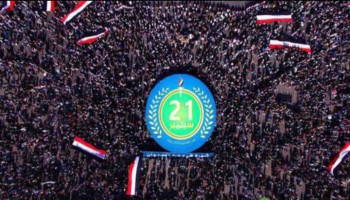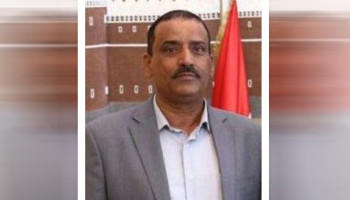Leader of the Revolution Sayyed Abdulmalik Badr al-Din al-Houthi affirmed on Sunday that the most significant accomplishment of the September 21 Revolution was the fall of foreign dominance and guardianship over Yemen, describing it as a historic and unparalleled victory for the Yemeni people.
In a speech marking the 11th anniversary of the popular revolution, Sayyed Abdulmalik stressed that the Yemeni people remain steadfast in their revolutionary course, committed to correcting national institutions and confronting enemies despite the difficult circumstances and heavy legacy of decades of looting and mismanagement.
He said the September 21 Revolution was distinguished from other uprisings by its ethical conduct and clean record, avoiding political vendettas or violent excesses. Instead, it brought security and stability across the country, reflecting the values of tolerance, brotherhood, and faith.
Sayyed Abdulmalik underlined that the revolution ended an era of complete subordination to Washington, where the US ambassador in Sana’a openly dictated national policies and interfered in security, education, judiciary, and even religious institutions. He recalled that American directives at the time pushed Yemen toward collapse, while Zionist plots sought to sow sectarianism, encourage deviant sects, and erode Yemen’s faith-based identity.
He said the liberation achieved by the revolution restored to Yemenis the true human value of freedom and independence, allowing them to preserve their faith identity and lay the foundations for building a sovereign and resilient nation.
The leader pointed out that before the revolution, Yemen suffered deep economic decline, insecurity in the capital, targeted assassinations, rampant criminality, and deliberate dismantling of the national army under American supervision. US and Zionist agendas, he said, worked to fracture the social fabric and make Yemen pliant to external control.
Sayyed Abdulmalik revealed that the September 21 uprising alarmed foreign powers, particularly the American and Zionist enemy. He cited Israeli Prime Minister Benjamin Netanyahu, who described the revolution as “the most dangerous development in the region.” He explained that Yemen’s freedom and faith-based awakening threatened the Zionist project of establishing “Greater Israel.”
He stressed that the American and Zionist enemy quickly mobilized their regional tools to confront the revolution, with Saudi Arabia forming a coalition under direct US supervision, driven by the Israeli enemy and supported by Britain. These powers, he said, engineered and oversaw the aggression on Yemen, which continues through military occupation of wide areas, looting of resources, and suffocating economic warfare.
Sayyed Abdulmalik concluded that despite years of aggression, siege, and atrocities, the American, British, and Zionist enemy and their regional proxies have failed in Yemen, while the Yemeni people remain firm in their revolutionary stance and unwavering in their support for the Palestinian cause.
The September 21 Revolution, led by Ansarullah in 2014, toppled Yemen’s former government and ended years of US tutelage over the country’s decision-making. Since 2015, Yemen has faced a devastating US-Saudi-led military intervention. The war, now in its second decade, has entrenched Ansarullah as the dominant force in northern Yemen, while Yemen’s alignment with the Palestinian cause and its confrontations with the Israeli enemy in the Red Sea have given the revolution a regional dimension







